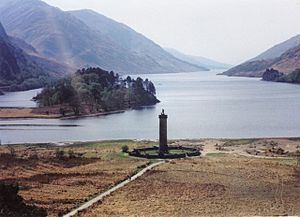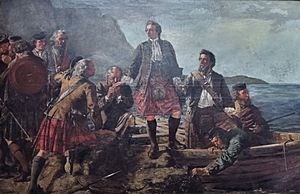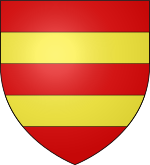Donald Cameron of Lochiel facts for kids
Quick facts for kids
Donald Cameron of Lochiel
|
|
|---|---|
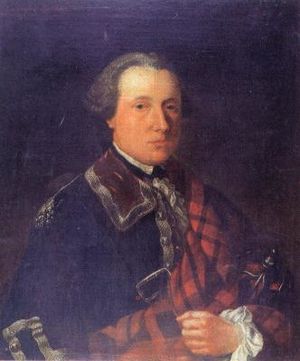
1762 painting suggested as based on 1748 sketch of Lochiel, now in Achnacarry House
|
|
| Born | c. 1695 Achnacarry, Lochaber, Scotland |
| Died | 26 October 1748 (aged 53) Bergues, France |
| Resting place | Bergues Communal Cemetery |
| Title | 19th Lochiel |
| Tenure | ca 1719–1748 |
| Wars and battles | 1745 Jacobite Rising Prestonpans Falkirk Culloden War of the Austrian Succession Lauffeld |
| Offices | Colonel, Cameron of Lochiel's Regiment 1745–1746 Colonel, Régiment d'Albanie 1747–1748 Order of Saint Michael |
| Spouse(s) | Anne Campbell |
| Issue |
|
| Parents | John Cameron, 1st Lord Lochiel Isobel Campbell |
|
|
|
Donald Cameron of Lochiel (around 1695 – 26 October 1748) was a Scottish leader, soldier, and the chief of Clan Cameron. He was known as the Gentle Lochiel. His family, the Camerons, were traditionally loyal to the House of Stuart, a royal family that had lost the British throne.
Donald Cameron played a very important role in the Jacobite rising of 1745, a rebellion led by Prince Charles Edward Stuart (also known as Bonnie Prince Charlie). After the Jacobite forces were defeated at the Battle of Culloden, Lochiel had to escape to France.
Donald's father was forced to live in exile after an earlier rebellion in 1715. When Donald's grandfather, Sir Ewen Cameron, died in 1719, Donald became the acting chief of the Camerons. The Clan Cameron was very important because their lands were close together, making them a strong, united group. Even though Donald had doubts about starting the rebellion, he and his clan became key players in the 1745 Rising.
After the defeat at Culloden, Lochiel was wounded and had to hide with Prince Charles. His home, Achnacarry Castle, was burned down, and his lands were taken away. He escaped to France in late 1746. In France, he became a Colonel in the French army and was given an important award by King Louis XV. He died in Bergues, France, on 23 October 1748.
Contents
Early Life and Family
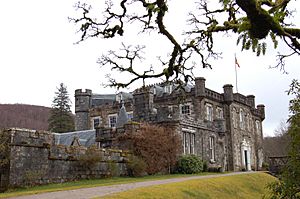
Donald was the oldest son of John Cameron of Lochiel (1663–1747). His father was a strong supporter of the Stuart family and took part in earlier rebellions in 1708, 1715, and 1719. Because of this, his father lived the rest of his life in exile. When Donald's grandfather, Sir Ewen Cameron, passed away in 1719, Donald took over as the clan chief. From then on, he was known as Lochiel.
Donald had several brothers. One was John Cameron of Fassiefern (1698–1785). Another was Alexander Cameron (1701–1746), a priest who died after being captured at Culloden. His brother Archibald Cameron (1707–1753) was a doctor who escaped with Lochiel to France. However, Archibald was later arrested when he returned to Scotland and was executed.
In 1729, Lochiel married Anne Campbell (1707–1761). Her family, the Campbells, also had some members who supported the Stuart cause. Anne's father was Sir James Campbell. Lochiel and Anne had three sons and four daughters. As a young man, Lochiel visited his father in Paris and learned a lot about the Stuart cause. By 1729, Lochiel became the main agent for James Francis Edward Stuart (the "Old Pretender") in the Scottish Highlands.
Role in the 1745 Rising
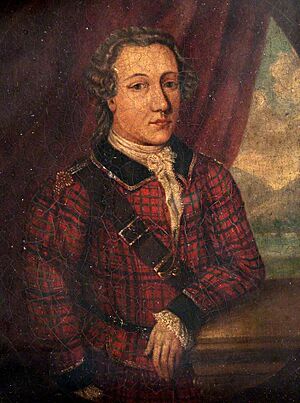
For many years, Highland chiefs had a system where land managers, often relatives, rented land and provided men for military service. However, this old system was changing. Some chiefs were starting to rent land to the highest bidder instead. Lochiel reportedly wanted to do this too, but the "Old Pretender" asked him not to, as he wanted to keep the clans' military strength ready.
The British government also tried to control the Highlands. Between 1725 and 1738, General George Wade built a network of military roads. These roads connected forts like Fort Augustus and Fort William, which helped the government control areas like Lochaber, where the Camerons lived. These changes reduced the power of chiefs like Lochiel.
In 1740, a big war started between Britain and France, called the War of the Austrian Succession. France saw a chance to cause trouble for Britain by supporting the Stuarts. Lochiel and six other leaders agreed to support a Stuart return, but only if France provided military help. In late 1743, King Louis XV of France planned an invasion of England. Prince Charles went to Dunkirk to join the invasion, but bad storms damaged the French fleet, and the plan was cancelled.
Prince Charles Arrives
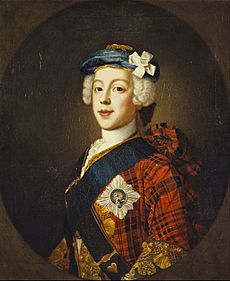
Prince Charles then decided to go to Scotland, even if it meant going alone. When he landed on Eriskay in July 1745, Lochiel at first refused to meet him. Lochiel and other leaders had signed a paper asking Charles not to come without 6,000 French troops, money, and weapons.
However, Charles eventually persuaded Lochiel to join him. Lochiel's brother, John Cameron, warned that emotion might win over his good judgment. This turned out to be true. Lochiel's decision was very important, as it convinced other clan leaders, like his cousin Macpherson of Cluny, to join the rebellion. Lochiel finally agreed only after Charles promised to pay him for his estate if the rebellion failed.
The rebellion officially began at Glenfinnan on 19 August 1745.
The first Jacobite army had about 900 to 1,100 men, mostly Camerons and MacDonalds. Lochiel, though new to military command, proved to be a good leader. The Camerons were one of the most reliable groups in the Jacobite army. Lochiel's quick thinking helped them capture Edinburgh without a fight in September. The Camerons also fought bravely at the Battle of Prestonpans, a battle that lasted less than 15 minutes.
March to England and Retreat
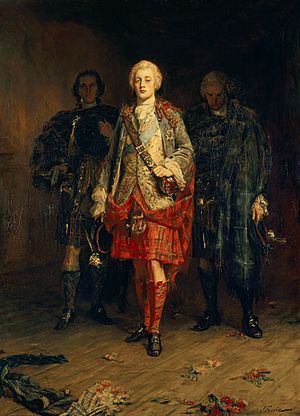
After Prestonpans, the Jacobites debated their next move. The Scottish leaders, including Lochiel, mostly wanted to end the Union of 1707 between Scotland and England. They were not very interested in invading England. Lochiel earned his nickname "Gentle" because he insisted that there should be no revenge against their opponents in Edinburgh. This was a smart move if they wanted to create an independent Scotland.
The War Council, made up of the main Highland chiefs, decided to invade England on 31 October. They did this with great hesitation, and only because Charles claimed he had promises of English and French support. When these promises didn't come true, the Council voted to retreat at Derby. This was a big blow, as Charles had to admit he had lied. Lochiel, though silent during the meeting out of respect for Charles, was among the large majority who agreed to retreat.
The army marched back into Scotland. On 8 January, the Jacobites surrounded Stirling and defeated a government attempt to help the fort at the Battle of Falkirk on 17 January. Despite this victory, they left Stirling on 1 February and moved north to Inverness. Lochiel took his regiment to attack Fort William, which was still held by government troops. They left the siege to rejoin the main army for the Battle of Culloden on 16 April. The Camerons suffered heavy losses at Culloden, and Lochiel was badly wounded and carried off the battlefield.
The defeat at Culloden ended the rebellion. Lochiel later said that the Duke of Cumberland offered him and his clan terms if they surrendered their weapons, but he refused. In late May, Lochiel, Lord George Murray, and Prince Charles met to discuss what to do next, but there was little desire to continue fighting. Lochiel, his brother Archibald, and Prince Charles were hidden by their cousin Cluny until a French ship picked them up in September.
Exile and Legacy
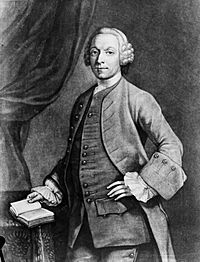
After 1747, the French government was more interested in making peace than in helping the Stuarts. They ignored requests from Charles and Lochiel for another attempt to invade Britain.
In France, Lochiel was made a Colonel in the French army and given an important award by King Louis XV. He was also knighted by Prince Charles. Lochiel became Lord Lochiel in the Stuart peerage after his father died around 1747. He and his family lived in Fontainebleau. Lochiel wrote a book about his life called Memoires d'un Ecossais, which he gave to King Louis. He never returned to Scotland.
Lochiel died from a stroke on 26 October 1748 in Bergues, France, where he is buried. His son John took over as chief. John was allowed to return home in 1759 but died in 1762. The family's lands were given back to them in 1784.
The nickname 'Gentle Lochiel' became popular after his death. While he was known as an honorable and principled man, his time as chief was very difficult for his clan and family. The Camerons lost many men at Culloden. His nephew Donald was killed, and his brother, Father Alexander Cameron, died in prison. His other brother, Archibald Cameron, was later executed.
Family
Lochiel married Anne Campbell, who was the daughter of Sir James Campbell of Auchinbreck. They had three sons and four daughters:
- John Cameron, 20th Lochiel (1732–1762): He became chief in 1748 but died without children.
- Captain James Cameron (1736–1759): He was an officer in the French army and died without children.
- Charles Cameron, 21st Lochiel (around 1747–1776): He became chief in 1762.
- Isobel Cameron: She married Chevalier Morres, who was in the French service.
- Janet Cameron: She became a nun in a convent in Paris.
- Henrietta Cameron: She married Captain Portin, who was in the French service.
- Donalda Cameron: She never married.
|


